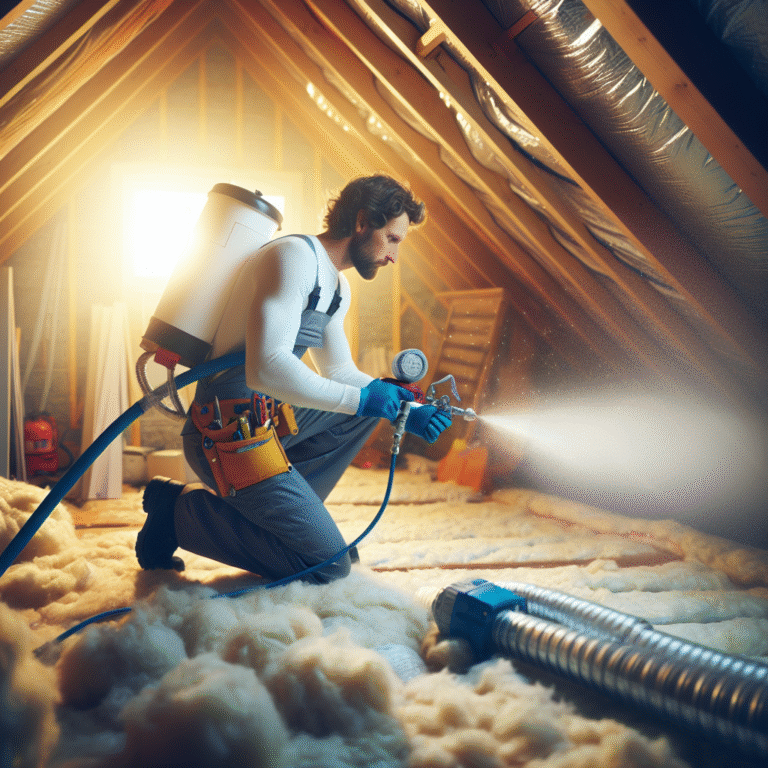-
Table of Contents
“Save money and the environment with proper attic insulation.”
“Boost your home’s energy efficiency and save money on your utility bills with proper attic insulation. Visit texasinsulationsolution.com to learn more and schedule a consultation today!”
Introduction
Attic insulation is an essential component of a home’s energy efficiency. It helps to regulate the temperature inside the house, keeping it cool in the summer and warm in the winter. In addition, proper attic insulation can significantly reduce energy costs by preventing heat loss and air leakage. In this guide, we will discuss the importance of attic insulation and provide tips on how to boost your home’s energy efficiency with attic insulation. By following these steps, you can create a more comfortable and cost-effective living space for you and your family.
The Benefits of Using Spray Foam Insulation in Your Attic for Improved Energy Efficiency
As homeowners, we are constantly looking for ways to save money on our energy bills while also reducing our carbon footprint. One often overlooked area of the home that can greatly impact both of these goals is the attic. By properly insulating your attic, you can significantly improve your home’s energy efficiency. And when it comes to attic insulation, spray foam is a top choice for many homeowners. In this article, we will explore the benefits of using spray foam insulation in your attic for improved energy efficiency.
First and foremost, spray foam insulation is known for its superior insulating properties. Unlike traditional insulation materials such as fiberglass or cellulose, spray foam expands and fills every nook and cranny in your attic, creating an airtight seal. This means that there are no gaps or spaces for air to escape, making it a highly effective insulator. In fact, spray foam has been shown to have a higher R-value (a measure of insulation’s ability to resist heat flow) than other types of insulation, meaning it provides better thermal resistance and therefore better energy efficiency.
Another benefit of spray foam insulation is its ability to act as a barrier against moisture. Moisture in the attic can lead to mold and mildew growth, which not only poses health risks but can also cause damage to your home’s structure. Spray foam insulation is impermeable to water, preventing moisture from seeping into your attic and causing these issues. This can also help to prolong the lifespan of your roof, as moisture can weaken the structure and lead to costly repairs.
In addition to its insulating and moisture-resistant properties, spray foam insulation also has a long lifespan. Unlike traditional insulation materials that can compress or settle over time, spray foam maintains its shape and effectiveness for many years. This means that you won’t have to worry about replacing your attic insulation anytime soon, saving you both time and money in the long run.
Furthermore, spray foam insulation can also improve the overall air quality in your home. As mentioned earlier, it creates an airtight seal, preventing outside air from entering your home and reducing the amount of dust, pollen, and other allergens that can make their way inside. This is especially beneficial for those who suffer from allergies or respiratory issues. Additionally, the airtight seal created by spray foam insulation can also help to reduce noise from outside, making your home a more peaceful and comfortable place to live.
One of the most significant benefits of using spray foam insulation in your attic is the potential for cost savings on your energy bills. By creating an airtight seal and preventing air from escaping, your HVAC system won’t have to work as hard to maintain a comfortable temperature in your home. This can result in lower energy bills, especially during extreme weather conditions. In fact, studies have shown that homeowners can save up to 50% on their energy bills by properly insulating their attics with spray foam.
In conclusion, there are numerous benefits to using spray foam insulation in your attic for improved energy efficiency. From its superior insulating properties and moisture resistance to its long lifespan and potential cost savings, it is a smart investment for any homeowner looking to improve their home’s energy efficiency. So if you want to save money on your energy bills while also reducing your carbon footprint, consider using spray foam insulation in your attic. Your wallet and the environment will thank you.
Why Durable Attic Insulation is Key to Lowering Your Home’s Energy Costs
As homeowners, we are constantly looking for ways to save money and reduce our energy consumption. One often overlooked area that can have a significant impact on our energy bills is the attic. Proper insulation in the attic can greatly improve the energy efficiency of our homes, leading to lower energy costs and a more comfortable living environment. In this article, we will discuss the importance of durable attic insulation and how it can help you save money and energy.
First and foremost, let’s understand what attic insulation is and why it is important. Attic insulation is a material that is installed in the attic to prevent heat transfer between the living space and the outside environment. In simpler terms, it acts as a barrier to keep the warm air inside during the winter and the cool air inside during the summer. Without proper insulation, your home becomes vulnerable to outside temperatures, making it difficult to maintain a comfortable temperature inside.
Now, you may be wondering why durable attic insulation is specifically mentioned. The durability of insulation is crucial because it determines how long it will last and how well it will perform. Attic insulation that is not durable can quickly deteriorate, leading to gaps and spaces that allow air to escape. This not only reduces the effectiveness of the insulation but also leads to higher energy costs as your heating and cooling systems have to work harder to maintain the desired temperature.
One of the main benefits of durable attic insulation is its ability to lower your energy costs. According to the U.S. Department of Energy, proper insulation can save homeowners up to 20% on their heating and cooling costs. This is because insulation helps to keep the temperature inside your home consistent, reducing the need for your HVAC system to constantly turn on and off. This not only saves you money but also reduces the strain on your heating and cooling systems, potentially extending their lifespan.
In addition to saving money, durable attic insulation also contributes to a more comfortable living environment. Without proper insulation, your home can experience drafts, hot or cold spots, and inconsistent temperatures. This can make it difficult to relax and can even lead to health issues for those with respiratory problems. With durable attic insulation, you can maintain a consistent and comfortable temperature throughout your home, making it a more pleasant place to live.
Another important aspect of durable attic insulation is its impact on the environment. By reducing your energy consumption, you are also reducing your carbon footprint. This is because the majority of energy in homes is produced by burning fossil fuels, which release harmful greenhouse gases into the atmosphere. By using less energy, you are helping to reduce the amount of greenhouse gases being emitted, contributing to a healthier planet for future generations.
In conclusion, durable attic insulation is key to lowering your home’s energy costs and improving its energy efficiency. It not only saves you money but also contributes to a more comfortable living environment and a healthier planet. If you are considering upgrading your attic insulation, be sure to choose a durable and high-quality material. It may require a larger upfront investment, but the long-term benefits will far outweigh the initial cost. So, take the necessary steps to boost your home’s energy efficiency with durable attic insulation and start reaping the benefits today.
Maximizing Energy Efficiency: How Attic Insulation Can Make a Big Difference in Your Home
In today’s world, where energy conservation and sustainability are becoming increasingly important, it is essential to make our homes as energy-efficient as possible. Not only does this help reduce our carbon footprint, but it also leads to significant cost savings on energy bills. One area of the home that is often overlooked when it comes to energy efficiency is the attic. However, proper insulation in the attic can make a big difference in the overall energy efficiency of your home. In this article, we will discuss how attic insulation can boost your home’s energy efficiency and provide tips on how to maximize its effectiveness.
First and foremost, let’s understand why attic insulation is crucial for energy efficiency. The attic is often the most significant source of heat loss in a home. During the winter months, warm air rises and escapes through the attic, while in the summer, the hot air from the attic seeps into the living spaces, making it challenging to maintain a comfortable temperature. This constant exchange of air leads to increased energy consumption as the heating and cooling systems have to work harder to maintain the desired temperature. By insulating the attic, you can prevent this heat transfer, resulting in a more energy-efficient home.
Now that we understand the importance of attic insulation let’s look at some ways to maximize its effectiveness. The first step is to determine the type of insulation that is best suited for your attic. There are various types of insulation available, such as fiberglass, cellulose, and spray foam. Each type has its advantages and disadvantages, and it is essential to consult a professional to determine the best option for your home. Factors such as the climate, budget, and existing insulation should be considered when making this decision.
Once you have chosen the type of insulation, the next step is to ensure proper installation. Improper installation can lead to gaps and voids in the insulation, reducing its effectiveness. It is crucial to hire a professional to install the insulation, as they have the necessary expertise and equipment to do the job correctly. Additionally, make sure that the insulation is installed in all areas of the attic, including the walls, floors, and ceiling. This will provide complete coverage and prevent any heat transfer.
Another way to maximize the effectiveness of attic insulation is to seal any air leaks. Even with proper insulation, air leaks can significantly impact the energy efficiency of your home. Common areas for air leaks in the attic include around pipes, vents, and electrical outlets. These can be sealed with caulk or weatherstripping to prevent air from escaping. Additionally, make sure that the attic hatch or door is also properly insulated and sealed.
Regular maintenance of attic insulation is also crucial for its effectiveness. Over time, insulation can settle and become compressed, reducing its R-value (a measure of insulation’s ability to resist heat flow). It is recommended to have your attic insulation inspected every few years and topped up if necessary. This will ensure that your home remains energy-efficient and comfortable.
In conclusion, attic insulation plays a significant role in boosting your home’s energy efficiency. By preventing heat transfer and air leaks, it can lead to significant cost savings on energy bills. It is essential to choose the right type of insulation, have it properly installed, and regularly maintain it to maximize its effectiveness. With these tips in mind, you can make your home more energy-efficient and contribute to a greener and more sustainable future.
Q&A
1. What is attic insulation?
Attic insulation is a material that is installed in the attic of a home to help regulate the temperature and improve energy efficiency. It acts as a barrier to prevent heat from escaping in the winter and entering in the summer.
2. How does attic insulation help boost a home’s energy efficiency?
Attic insulation helps boost a home’s energy efficiency by reducing the amount of heat transfer between the attic and the rest of the house. This means that the home will stay cooler in the summer and warmer in the winter, reducing the need for heating and cooling systems to work harder and use more energy.
3. What are some types of attic insulation?
There are several types of attic insulation, including fiberglass, cellulose, and spray foam. Fiberglass insulation is made of tiny glass fibers and is one of the most common types. Cellulose insulation is made of recycled paper and is often used in older homes. Spray foam insulation is a liquid that expands and hardens into a foam, providing a tight seal and high level of insulation.
Conclusion
In conclusion, attic insulation is a crucial component in boosting a home’s energy efficiency. It helps to regulate the temperature inside the house, reducing the need for excessive heating or cooling. By properly insulating the attic, homeowners can save on energy costs and reduce their carbon footprint. It is important to choose the right type of insulation and ensure proper installation to maximize its effectiveness. Regular maintenance and upgrades can also help to maintain the insulation’s efficiency. Overall, investing in attic insulation is a smart and effective way to improve the energy efficiency of a home.




